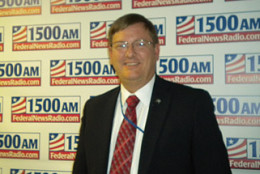retention
-
Although resignations are up among under-30 feds, the bigger problem is hiring, says Jeff Neal, former chief human capital officer at the Department of Homeland Security.
July 15, 2014 -
The lack of 30-and-under talent in the federal workforce means agencies will be facing significant shortfalls in the future, says Jeff Neal, former chief human capital officer at the Department of Homeland Security.
July 11, 2014 -
Federal chief human capital officers are starting to say that working within the current federal HR system may not be the answer to improving hiring, firing and other personnel processes. Instead, they say it's time to make wholesale changes to the increasingly unwieldy human resources system. Federal News Radio's executive editor Jason Miller joined Tom and Emily on the Federal Drive to discuss ideas on how to fix the federal HR system. Read Jason's related article.
May 22, 2014 -
People work better and more efficiently when they feel respected. And lately, Congress hasn't done a lot to make federal workers feel valued, says Sen. Jon Tester (D-Mont.) in a column written for Federal News Radio's special report, Trust Redefined: Reconnecting Government and Its Employees. But, Tester says, he has a plan to start changing that low morale.
May 22, 2014 -
Avue Technologies Co-CEO Linda Rix will discuss some ideas on how to make the federal government a more attractive option for job seekers. March 28,2014 (Encore presentation April 4, 2014)
March 28, 2014 -
Federal hiring declined last year, with new government hires dropping to fewer than 90,000 in fiscal 2012. The dip in hiring caused the size of the federal workforce to retract slightly to about 2.1 million federal workers — about on par with 2009 levels, according to new government data compiled by the Partnership for Public Service.
September 11, 2013 -
Federal Employees with Disabilities, or FEDs, is an organization that promotes equality in the workplace for persons with disabilities. FEDs focuses on addressing inclusion and breaking attitudinal barriers.
September 11, 2013 -
The Office of Personnel Management wants more information on why members of the Senior Executive Service are leaving their jobs. It's hoping a new exit survey being distributed to departing SES employees will help agencies improve their retention, recruitment and succession planning efforts. OPM said it wants employees to be as candid as possible with their answers to the anonymous survey.
March 26, 2013 -
As the Internal Revenue Service prepares to enter tax season full-bore, the agency is faced with a tightened budget, a shrinking workforce and an ever-more complex and increasing workload. That combination, along with leadership changes at the top of agency, threatens to upend the gains IRS has made over the past few years to better manage its workforce, according to the Treasury Inspector General for Tax Administration, an agency watchdog.
February 07, 2013 -
Federal employees are skeptical their managers are making effective decisions about the federal workforce, according to a new report from the Merit Systems Protection Board. Just 24 percent of the employees agreed that their agencies properly addressed poor performers, while 29 percent of respondents indicated their organizations eliminated unnecessary programs and positions, according to the survey of 42,000 feds from 24 agencies and departments.
January 30, 2013 -
Budget constraints are top of mind for agency chief human capital officers. And with good reason. CHCOs say they are feeling the effects of the budget crunch, particularly in recruiting, retaining and training employees, according to a Federal News Radio survey. Eugene Hubbard, head of the National Science Foundation's Office of Information and Resource Management, told Federal News Radio the budget squeeze and shrinking workforces mean agency employees are doing more with less to keep pace with the mission.
November 20, 2012 -
The 18-month study found DoD is no longer the employer of choice for STEM workers, at a time it should be attracting a "high fraction of the highest-quality STEM workforce."
October 31, 2012 -
What's your worst nightmare? How about Dracula, Frankenstein and Nick Nolte appearing in your bedroom? Or is it the long-predicted retirement tsunami? Because maybe, after 13 years of building up, it's on its way, Senior Correspondent Mike Causey says.
October 15, 2012 -
If Uncle Sam really drives off the sequestration cliff in January, Senior Correspondent Mike Causey wants to know: Do you have a job parachute?
September 07, 2012 -
Hispanics accounted for more than eight in 100 civilian federal employees in 2011. The minority group also made gains in the Senior Executive Service and represented the third largest ethnic group in the federal government.
July 27, 2012



